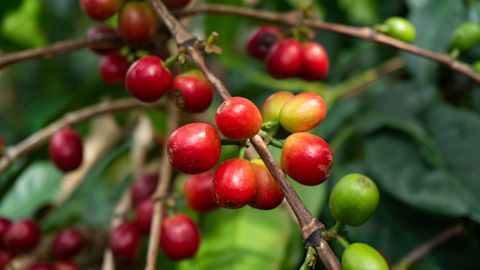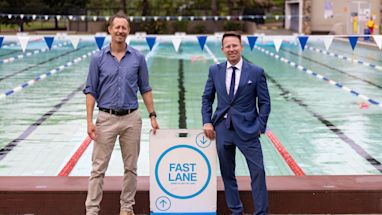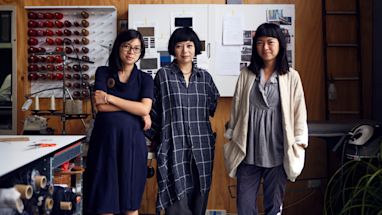Australians are big coffee drinkers. While more people are aware of the waste issues caused by disposable takeaway coffee cups, many probably have never thought about what happens to all the coffee grounds.
Coffee grounds are a natural fertiliser, can be used as a substrate to grow mushrooms, and also feature in beauty products. But much of the time they end up in landfill adding to carbon emissions.
Social enterprise Kua has come up with a zero-waste solution, ‘lending’ coffee beans to local businesses and taking back the coffee grounds for reuse. This is all with support of a City of Sydney grant.
They deliver specialty Ugandan grown coffee beans in benchtop canisters to Sydney workplaces through a subscription-based model.

“Spent coffee grounds have many amazing uses,” says Kua co-founder Darcy Small. “So we thought: what if we asked for the coffee grounds back? That’s where ‘lending’ comes in.
“We’re not the first to adopt this mindset, but the more we promote sharing and lending rather than ownership and consumption, the better for the environment.”
The grounds are provided to a network of community gardens throughout Sydney.
“There’s Indigrow, an Aboriginal Social Enterprise in La Perouse. They used a lot of our coffee grounds until they reached capacity,” says Darcy.
“Then we've had some smaller organisations like the Randwick Sustainability Hub and Camdenville Community Garden in Newtown.
“Another social enterprise called Raise the Bar took some of our coffee grounds and turned them into body scrubs.
“Basically anyone that wants the coffee grounds to do something cool with, we like to partner with them!”
So far Kua’s saved over 5000 kilos of coffee grounds from landfill – that’s the waste from over 200,000 cups of coffee.
But keeping the grounds out of landfill isn’t the only good to come from the project. 100% of the profits go to farmers in Uganda to help build resilience to climate change into their farms.
Through a partnership with ECOTRUST, the project supports farmers to plant native trees to sequester carbon and build terraced waterways. This helps regreen the mountains where the coffee is grown and stabilise the slopes.

Growing the non-profit model with environment grants
A strong connection to Uganda is at the core of this local social enterprise.
Kua had its origins in a trip to the country by Darcy and his co-founder Brody Smith as part of a UNSW Sydney Engineering program. While they were there, they formed a connection with a local who had grown up in a community of smallholder coffee farmers. The duo decided to bring some of the specialty coffee home to see if they could sell it, reinvest the profits in the community it came from, and run a business with zero-waste.
The City of Sydney has supported their journey with two environmental performance – innovation grants. These grants help Sydneysiders test a new technology or process that can benefit the green and circular economy and isn’t already being used locally.

In 2019 Kua received funding for a feasibility study. It allowed them to run a pilot project testing their concept with 6 workplaces.
“The grant allowed us to experiment with our business model. It gave us the confidence to try something different. Even though our pilot didn't perfectly work, it showed us the business-to-business model had real potential.”
In 2020, Kua successfully applied for the second phase of support, which provides 50% matched funding to further grow the project. The plan was to use the latest grant to scale the project across more businesses in the city.
“Just before Covid-19 arrived, we’d grown the businesses we worked with to 30. The second grant was positioned to get us to 50 or 60 at which point we should be able to continue by ourselves unsupported.”
Reworking the business model in response to Covid-19
The move to working from home has stalled the need for office coffee supplies. The Kua team continue to have conversations with their partner businesses to understand their return to work plan.
“We expect most will be back to work at probably around 50% capacity towards the end of the year. But we've remodelled everything to assume that we're starting from zero again and we’ll try and onboard both new and older customers over the next 12 months.”
“In the meantime, we've launched a similar service for people who want to continue drinking our coffee while working from home.”
They’ve also had to reconsider the way they deliver a closed-loop product for home consumers – previously workplaces were the collection points for the coffee waste.
“The packaging is 100% compostable. It also comes with educational material around what to do with your coffee grounds at home, whether that's dropping onto a local community garden or using them as a body scrub.”

They’ve been using this time to map the entire circular impact of their business using digital platform Unleashed.
“Things like canisters are now serialised so we know where they've been, how many life cycles they have had, and how much waste they've collected. I'm excited to get some real data on our environmental impact.”
One thing they don’t have to worry about at the moment is coffee supply.
“We bought about 4 tonnes of coffee last year in Uganda, which arrived in May. Because of Covid, we've got more supply than we need. It will last for the next 12 months.
“We’ve got strong partnerships and Uganda is starting to get back to normal, so we should be able to repurchase at the same time next year. We just won’t be able to visit in person.”
They say having the grant has helped keep them motivated. “It’s given us support and a network. That's important while you're growing something.”
To stay up to date on our grants and sponsorships opportunities, subscribe to the grants newsletter. We'll let you know all the latest information, grants opening dates and more.
Published 25 August 2020, updated 26 July 2021



